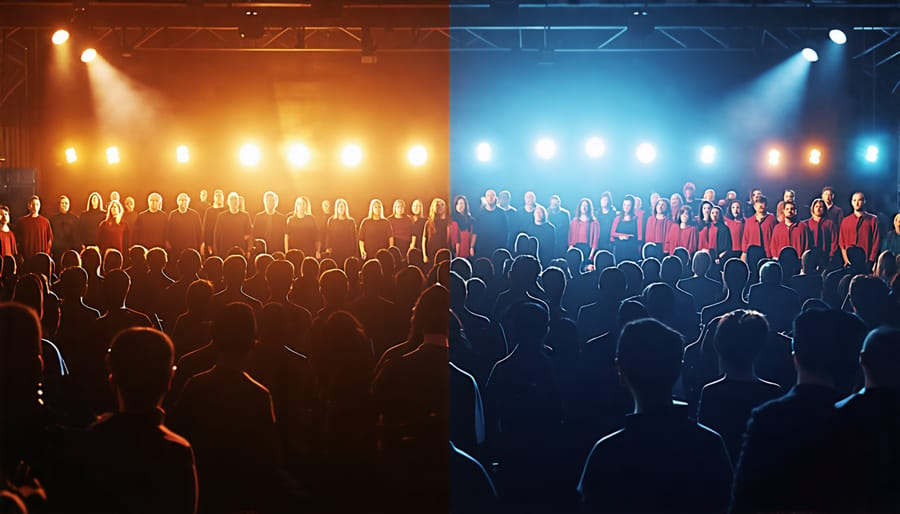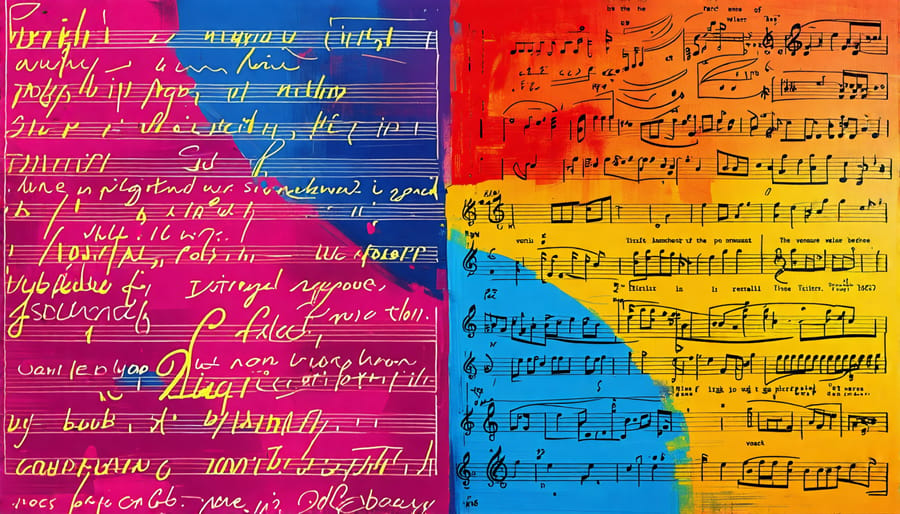Discover the profound differences between sacred and secular music that shape our spiritual lives. Sacred music, rooted in faith and devotion, lifts our hearts to the divine through hymns, chants, and gospel songs. In contrast, secular music reflects the joys and struggles of earthly existence, from love ballads to protest anthems. Yet both have the power to move us deeply. By understanding their distinct purposes, lyrics, styles, and settings – from the solemnity of a church to the energy of a concert hall – we gain insight into how music connects us to God, one another, and our own souls. As Christians, exploring the rich tapestry of Christian traditions in sacred music deepens our worship and sense of community. At the same time, finding glimpses of the sacred within secular songs reminds us that God’s presence permeates all of creation. Join us as we illuminate the seven key differences between sacred and secular music, and how each enriches our faith journey in profound ways.
Purpose and Inspiration
The purpose and inspiration behind sacred and secular music stem from fundamentally different sources. Sacred music, such as hymns, worship songs, and liturgical pieces, is created with the primary goal of glorifying God and facilitating spiritual worship. The lyrics and melodies are often inspired by biblical passages, divine attributes, and the desire to express devotion to the Lord. Sacred music serves as a means to connect believers with their faith, offering praise, thanksgiving, and petitions to God.
In contrast, secular music typically draws inspiration from human experiences, emotions, and worldly themes. Songwriters often explore topics such as love, heartbreak, social issues, and personal struggles, aiming to resonate with listeners on a relatable level. While secular music can be uplifting and meaningful, its ultimate purpose is usually entertainment, self-expression, or commercial success rather than spiritual edification.
However, it is important to note that the line between sacred and secular music is not always clear-cut. Some artists may incorporate elements of faith into their secular work, while others may create music with a spiritual message that appeals to a broader audience beyond religious settings. Ultimately, the intention and context in which the music is created and performed play a significant role in determining its sacred or secular nature.
As Christians, recognizing the distinctions between sacred and secular music can help us appreciate the unique role that worship plays in our spiritual lives. By engaging with music that aligns with our faith and draws us closer to God, we can deepen our relationship with Him and find strength and inspiration in His presence.


Lyrics and Themes
The lyrics and themes of sacred and secular music stand in stark contrast. Sacred music, rooted in faith and worship, draws its inspiration from biblical truths, spiritual concepts, and the human relationship with God. The lyrics often directly quote or paraphrase scripture, reinforcing the message of God’s love, grace, and redemption. Themes revolve around praise, thanksgiving, repentance, and the Christian journey, with the ultimate goal of glorifying God and edifying the listener.
In contrast, secular music explores a vast array of topics, from love and heartbreak to social issues and personal experiences. While secular lyrics may occasionally touch on spiritual themes, they are not inherently faith-focused. Instead, they reflect the diverse realities of human life, often without explicit reference to religious beliefs. Secular music’s themes are as varied as the human experience itself, ranging from celebration and joy to introspection and critique of societal norms.
While both sacred and secular music have the power to evoke deep emotions and resonate with listeners, their fundamental differences lie in their purpose and source of inspiration. Sacred music aims to connect individuals with God and strengthen faith, while secular music primarily serves as a form of artistic expression and entertainment, reflecting the complexities of the human condition.
Musical Style and Composition
Sacred music, such as hymns, choral anthems, and liturgical pieces, often features harmonies and melodies designed to evoke a sense of reverence and spiritual contemplation. The instrumentation in sacred music may include organs, choirs, and orchestral arrangements that support the worshipful atmosphere. In contrast, secular music spans a wide range of styles, from pop and rock to jazz and hip-hop, with a focus on entertaining and engaging the listener. Secular compositions often feature catchy melodies, rhythmic beats, and lyrics that explore personal experiences, emotions, and worldly themes.
While sacred music composition techniques prioritize creating a sense of awe and reverence, secular music often employs hooks, repetition, and memorable choruses to captivate audiences. Sacred music may incorporate elements like counterpoint, fugues, and chant-like melodies, while secular music explores various song structures, such as verse-chorus form or through-composed pieces. Ultimately, the stylistic differences between sacred and secular music stem from their distinct purposes: one aims to connect listeners with the divine, while the other seeks to entertain and resonate with everyday human experiences.
Intended Audience and Setting
The intended audience and performance setting play a significant role in distinguishing sacred from secular music. Sacred music, such as hymns, worship songs, and liturgical pieces, is primarily composed for use in religious services and gatherings. Its purpose is to facilitate worship, prayer, and spiritual reflection among believers in a church or faith-based setting. The audience for sacred music consists mainly of congregants who come together to express their devotion and connect with God through song.
On the other hand, secular music is created for entertainment and enjoyment in various public venues, such as concert halls, festivals, clubs, and outdoor spaces. It caters to a diverse audience with different tastes and backgrounds, who attend performances primarily for leisure and artistic appreciation. Secular music encompasses a wide range of genres, from classical and jazz to pop and rock, each with its own style and appeal.
While sacred music aims to create an atmosphere of reverence and unity among believers, secular music seeks to engage and excite audiences through creative expression and technical skill. The contrasting intentions and contexts of these two musical realms contribute to their distinct characteristics and the way they are experienced by listeners.
Spiritual Impact and Influence
Sacred music, crafted with the intention of glorifying God and facilitating worship, has the power to profoundly impact the spiritual lives of believers. Through uplifting melodies, scripturally-inspired lyrics, and reverent tones, sacred music helps Christians draw closer to their Creator, experience His presence, and find solace in times of need. It serves as a conduit for expressing devotion, gratitude, and praise, nurturing the soul and strengthening faith.
In contrast, the spiritual impact of secular music varies greatly depending on its content and style. While some secular songs may convey positive messages of love, hope, or social justice that align with Christian values, others may promote worldly ideals or even contradict biblical teachings. As such, Christians must exercise discernment when engaging with secular music, being mindful of its influence on their thoughts, emotions, and actions. By carefully selecting music that uplifts and inspires, while avoiding that which undermines their faith, believers can ensure that their musical choices contribute to their spiritual growth and well-being.
Conclusion
In conclusion, sacred and secular music differ in their purpose, lyrics, style, setting, and spiritual impact. As Christians, it’s crucial to discern the music we engage with, considering how it aligns with our faith and values. While secular music can be entertaining and culturally relevant, sacred music is uniquely designed to worship God, proclaim biblical truth, and nurture our spiritual growth. As we seek to honor God in every aspect of our lives, let us be intentional about the music we listen to and create. May our musical choices reflect our devotion to Christ and inspire us to draw closer to Him. Whether in church or in our daily lives, music is a powerful tool to express our faith, find encouragement, and glorify our Creator. By understanding the distinctions between sacred and secular music, we can more effectively use this gift to enrich our relationship with God and share His love with others.
